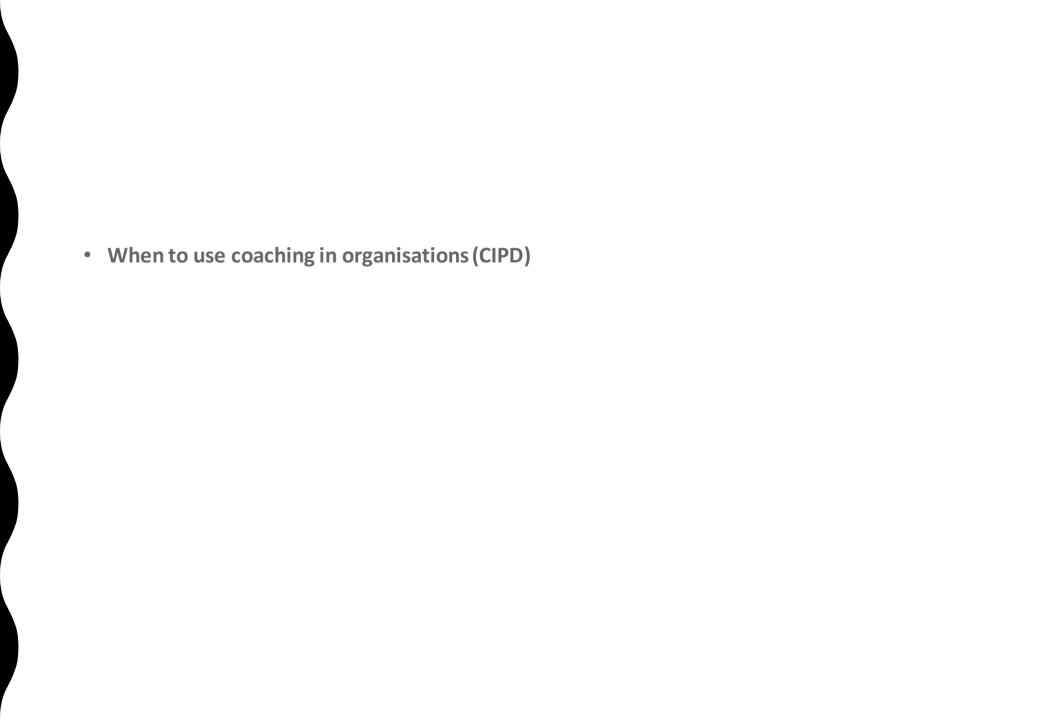
1 minute read
LEARNING OUTCOME 1
Assessment Criteria 1.2 Demonstrate how the relationship between individual, team and departmental performance development links to coaching
Assessment Criteria 1.3 Demonstrate how the relationship between individual, team and departmental performance developmentlinks to mentoring
Advertisement
Assessment Criteria 1.4 Develop a case that coaching and mentoring can benefit organisationalstrategic performance objectives through individual, team and departmental performance development
Assessment Criteria 1.5 Conduct a cost/benefit analysis of a coaching and mentoring process to support achievement of organisational strategic performance objectives
Resources Books
1 ANDERSON, V., RAYNER,C. and SCHYNS, B. (2009) Coachingat the sharp end: the role of line managers in coaching at work. London:Chartered Institute of Personnel and Development. Available at: http://www.cipd.co.uk/hr-resources/database-search.asp
2 BEEVERS, K. and REA, A. (2016) Learningand development practice in the workplace. 3rd ed. London:Chartered Institute of Personnel and Development.
3 BLAKEY,J. and DAY,I. (2012) Challenging coaching:going beyond traditional coachingto face the FACTS. London: Nicholas Brealey Publishing.
4 CLUTTERBUCK,D. (2014) Everyone needs a mentor. 5th ed. London:Chartered Institute of Personnel and Development.
5 CLUTTERBUCK,D., MEGGINSON, D. and BAJER, A. (2016) Building and sustaininga coachingculture. London: Chartered Institute of Personnel and Development.
6 CONNOR, M.P. and POKORA, J.B. (2012) Coaching and mentoring at work: developing effective practice.
2nd ed. Maidenhead: Open University Press.
7 COX, E. (2013) Coaching understood: a pragmatic enquiry into the coaching process. London: Sage Publications.
8 COX, E., BACHKIROVA, T. and CLUTTERBUCK, D.A. (2014) The complete handbook of coaching. 2nd ed. London: Sage Publications.
9 DOWNEY, M. (2014) Effective modern coaching: the principles and art of successful business coaching. London: LID Publishing.
10 FLAHERTY, J. (2010) Coaching: evoking excellence in others. 3rd ed. Abingdon: Routledge
• 11 GARVEY, B., STOKES, P. and MEGGINSON, D. (2014) Coaching and mentoring: theory and practice. 2nd ed. London: Sage Publications.
• 12 KAY, D. and HINDS, R. (2012) A practical guide to mentoring: using coaching and mentoring skills to help others achieve their goals. 5th ed. Oxford: How To Books
• 13 KNIGHTS, A. and POPPLETON, A. (2008) Developing coaching capability in organisations. London: CIPD. Available at: http://www.cipd.co.uk/hr-resources/database-search.aspx
• 14 PARSLOE, E. and LEEDHAM, M. (2009) Coaching and mentoring: practical conversations to improve learning. 2nd ed. London: Kogan Page.
• 15 PELTIER, B. (2010) The psychology of executive coaching: theory and application. 2nd ed. Hove: Routledge.
• 16 WHITMORE, J. (2009) Coaching for performance: growing human potential and purpose – the principles and practice of coaching and leadership. 4th ed. London: Nicholas Brealey Publishing.








